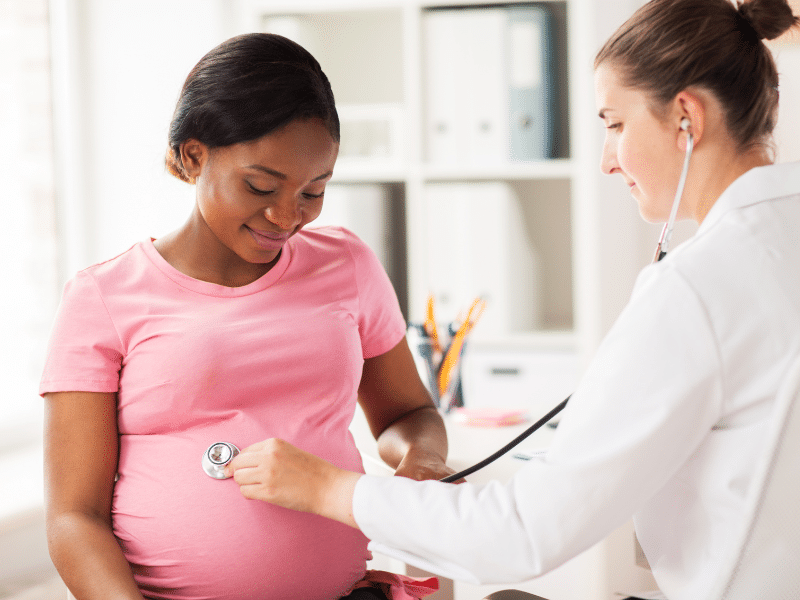If you are expecting your first child, congratulations! Motherhood is an absolute blessing and our team at Indianapolis Moms is happy to welcome you to the New Mom Club. As you prepare to give birth and bring your baby home, you might find yourself having lists of questions about all things baby, the fourth trimester, and how to handle it all. It’s a lot, so we’ve got your back! We recently teamed up with Erin Harkess-Niemiec, the Childbirth Education Coordinator with IU Health, on frequently asked questions from new moms.

Breastfeeding: After I leave the hospital, how do I handle breastfeeding challenges at home in a new environment?
Erin highly recommends preparing for breastfeeding by taking a breastfeeding class. IU Health provides several childbirth classes and she also says financial help is available. Along with breastfeeding education, understand that it may take a couple weeks to feel more confident with breastfeeding. Erin suggests doing skin-to-skin after you get home from the hospital, as well as breastfeeding frequently, paying attention to your baby’s hunger cues. She also says to pay attention to how your baby is latching and giving signs of milk transfer. Track your baby’s feedings as well as their wet and poopy diapers each day.
Most importantly – let others support you. “Remember, both you and your baby are learning a new skill!” Erin says. “Be patient with yourself and give yourself grace.” She continues by saying that if there are challenges with feeding, milk supply concerns, or just wanting reassurance that things are going well, IU Health can help. “The key is to reach out. You are not alone and do not have to figure this out by yourself.”
What lactation resources are available to new moms?
There are a variety of options for support that will work with your schedule, says Erin. She recommends the following:
- IU Health Breastfeeding Support Groups: Available in person, virtual, and online.
- Contact IU Health breastfeeding support for guidance or find a local International Board of Lactation Consultant (IBCLC) for a private consultation through the Lactation Network.
- Use only evidence-based sites in your research. Available online, a few recommendations include: Kelly Mom, Office on Women’s Health, Lamaze International, and DONA International.
- Warm line phone calls for support: Postpartum Support International (PSI) has a helpline. Call 1-800-944-4773, or call/text 1-833-852-6262 in English and Spanish 24/7.
- Refer to the resource list given to you at your breastfeeding class or given at the hospital before you are discharged.
- Inquire with your child’s pediatrician on breastfeeding support or recommendations.
Perinatal or postpartum hormonal or emotional issues – what should I expect? What’s normal and what’s not?
Erin says having a range of emotions is normal before and after delivery – it is caused by fluctuating hormones and lifestyle changes. “The ‘Baby Blues’ that are common after giving birth usually don’t require treatment, are very transient, and go away on their own after two to three weeks,” Erin says. “If your symptoms continue after those initial weeks or become worse, reach out to your healthcare provider, support group, or Postpartum Support International (PSI).”
Warning signs include:
- Excessive worrying and anxiety
- Persistent crying and sadness
- Irritability
- Inability to sleep, even though you are exhausted
- Inability to care for yourself or your baby
- Changes in appetite
- Extreme changes in behavior
Call 911 or go to the nearest emergency room if you are having thoughts of harming yourself and/or your baby, or are suffering from hallucinations (seeing and/or hearing things that are not there).
Indianapolis Moms worked with IU Health in 2023 on a postpartum mental health series for you to read – The Three Struggles of the Fourth Trimester with IU Health North, Postpartum Depression with Birdie Meyer and IU Health, and Postpartum Mental Health with an IU Health OB/GYN.
How and when should I find a pediatrician?
Erin says it is best to start looking for a provider before your baby is born. Rely on referrals! Ask your family, friends, and other providers for recommendations. Make sure to schedule a meet and greet while pregnant. Create a list of questions or refer to this list for inspiration. Taking an IU Health class is beneficial as they will provide a list of questions for you to ask during your search. If you haven’t made a formal choice on a pediatrician by the time you give birth – Erin says not to worry. “Most hospitals have a hospitalist that can see your baby while you are inpatient and can send the records to the provider you choose after delivery,” she says.
What should I expect after I give birth and take the baby home? For example, the overwhelming schedule of well-visits after being discharged from the hospital.
Expect it to be very busy after you return home from the hospital, with your baby’s first pediatrician appointment happening within 24-72 hours after coming home. Erin recommends you jot down questions and concerns as you think of them and take them with you to pediatrician visits. She also recommends to let others help. Friends, family, support people, your partner, and others such as neighbors – they want to help, and you need to let them. After all, you are healing from giving birth!
“Have someone come with you to the baby’s appointments,” Erin says. “It can be helpful if they take notes and provide you with extra support. If you have other children, let friends know you need help, and they may be happy to coordinate playdates to let you nap and have some time with the baby.” Other recommendations from Erin are meal planning, food delivery, and lists. Keep a grocery list on the refrigerator so anyone can look to see if you need anything from the store. Have quick and easy snacks available for when you may not have time to sit down for a meal. And have healthy snacks and drinks ready for when you are feeding the baby.
How soon after I have my baby can I begin pelvic floor therapy?
“Typically, you will have a visit with your healthcare provider six weeks after delivery,” Erin says. “Follow your healthcare provider’s guidance on when to return to exercise and pelvic floor therapy.” IU Health offers free pelvic floor classes, taught by IU Health physical therapists and clinicians. Learn more from a collaboration we did with a former Certified Specialist in Women’s Health Physical Therapy – Do I Need Pelvic Floor Therapy?
How can I combat loneliness, especially in the first days of postpartum? How can I meet other new moms going through a similar path as me?
As Erin has mentioned, IU Health offers support groups and community opportunities to meet other new moms. There are weekly group sessions for families with newborns as well as for those in toddlerhood and beyond. All of these are free for the community. She recommends checking out IU Health nature walks to meet other new moms. She also says the library often has programs geared towards children of different ages which could be another opportunity for connection.
It can be isolating after you come home from the hospital in those early weeks, even when you have plenty of help. Not only are you healing, you are adjusting to new routines and experiencing emotional and physical changes. Erin says, “Reach out to childbirth education about support groups and community opportunities to meet others. There are several options available.”
One of Erin’s biggest pieces of advice during the fourth trimester is to take time each day for yourself. It can even be five minutes – get fresh air, take a walk with your baby, listen to music, take a shower, make a special drink or snack you enjoy. Talk to your partner, support person, and family about your needs. Keep connected and remember it is okay to ask for help. “One of my favorite quotes I have heard in my 16 years of teaching came from Birdie Meyer,” Erin says. ‘We have seasons of giving and seasons of receiving.’ This is your season to receive.”
About Erin Harkess-Niemiec

Erin Harkess-Niemiec, LCCE, CD, CBE, CIMI, CLC, is the Coordinator for Childbirth Education at IU Health North, Riley Children’s Health, and IU Health West. She has multiple certifications – she is a Certified Birth & Postpartum Doula, Breastfeeding Educator, Lactation Counselor, Lamaze Certified Childbirth Educator, and Certified Infant Massage Instructor.

Named among the “Best Hospitals in America” by U.S. News & World Report for 22 consecutive years, Indiana University Health is dedicated to providing a unified standard of preeminent, patient-centered care. A unique partnership with Indiana University School of Medicine – one of the nation’s leading medical schools – gives our highly skilled physicians access to innovative treatments using the latest research and technology. Learn more at iuhealth.org.









